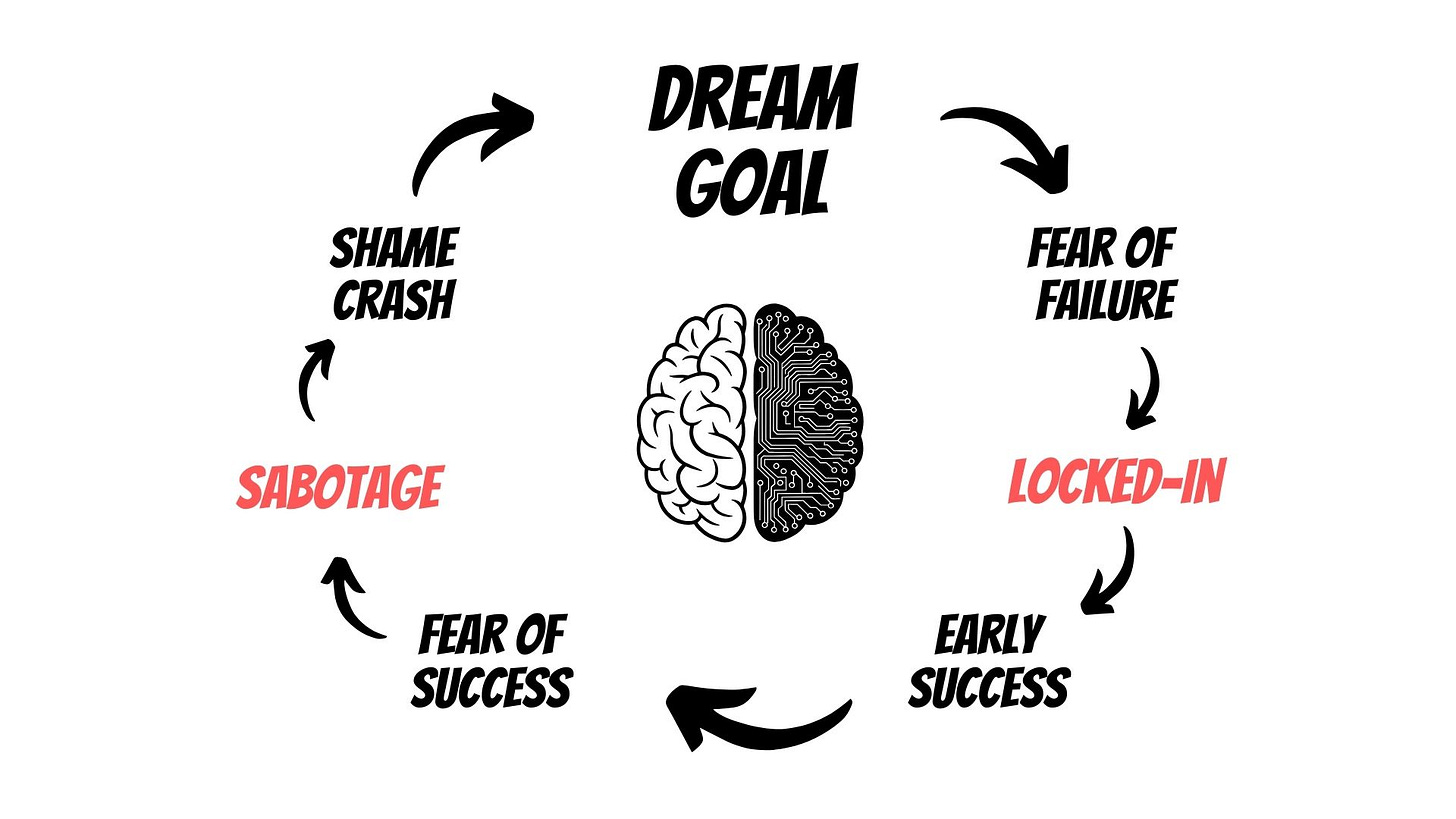🙀 Stuck In the Creative Doom Loop?
The Shame Of The Boom and Bust Cycle
We Are Paradoxical
If you’re a multipotentialite, you know the career boom and bust!
For months, I’m high on dopamine and momentum. Then I take my foot off the gas.
My career is a rollercoaster.
A fire hose of ideas, then bone dry.
It’s why I’m inconsistent.
It’s what keeps me stuck beneath my glass ceiling.
For years, I thought it was Neurodivergent burnout.
That’s part of it, but it runs much deeper.
Here’s the pattern that has held me back.
The Creative Doom Loop
Big, hairy, audacious goal.
Fear of failure sets me on fire.
I lock in, grind, work my ass off.
Success hits. Dopamine rush. Proof I can do it.
I start to get complacent 👉 sabotage begins.
Crash. Shame. Burnout.
Fear of failure reignites.
Another manic burst begins the next boom and bust cycle
(see image 👇)
Fear of Failure vs. Fear of Success
This is the boom and bust of many high achievers.
Our identity is built on high performance.
We are insecure overachievers.
Driven by shame. By not feeling good enough.
Fear of failure drives us to lock in and push harder.
But it only takes us so far.
What if your fear of rejection drives success but also limits your full potential?
What if it isn’t failure blocking you?
What if it’s a fear of success?
( I know…I know I also rejected this notion. I used to believe I was way too ambitious to have a fear of success.
Famed psychologist Abraham Maslow called this the Jonah Complex:
This is the paradoxical fear of realising your own potential.
It shows up as:
Self-sabotage at the brink of BIG success.
Downplaying or hiding talents so you don’t stand out.
Procrastination when a BIG breakthrough is possible.
Coasting after small wins, convincing yourself you’ve “earned the break.”
Imposter syndrome — believing you don’t deserve the success you already have.
Why does it happen, according to Maslow?
Success means a new identity, new responsibilities, and maybe being rejected by people you love because of your new success.
More visibility means more scrutiny.
Standing out risks losing belonging.
The higher you climb, the harder the fall.
And deep down, you don’t believe you’re worthy of sustained BIG success.
Maslow put it best:
“The evasion of one’s destiny, the avoidance of growth, the fear of one’s greatness.”
What if the fear of rejection drives your success but simultaneously limits your potential?!
This is the paradox of insecure achievement:
You achieve enough success to avoid rejection, but not enough success to expose yourself and risk rejection
This keeps you in a liminal space filled with unfulfilled ambition and frustration.
And it’s born in shame!
Shame is the root of the problem; the fear of success is one of its symptoms.
The paradox is this: the same shame that drives our success also limits our potential.
We are paradoxical.
Shame
Shame shows up in our work as:
Perfectionism
Procrastination
Fear of being seen
Identity crisis
Imposter syndrome
Inconsistency (the boom and bust cycle)
I’ve overcome all of these except the boom and bust cycle.
This is my Everest.
And it’s extremely common in high performing creative people.
Even the most successful artists I managed had two modes:
Before they were famous, they didn’t believe they were good enough to succeed.
Once successful, they didn’t believe they were good enough to stay successful.
That’s shame talking!
I’m breaking the cycle.
I don’t have all the answers, but I’m experimenting.
By moving toward the chains of shame instead of running from them
By embracing resistance.
We’re also building business and marketing systems to automate and remove creative pressure.
I’m experimenting with sports and high performance psychology techniques.
And neuroscience is clear: we can rewire our brains with repetition.
Small daily actions reshape not just habits but identity.
I’m doing a lot of breathwork and journaling.
Shame means hidden, so I’m exposing my shame here.
Because beyond the shame we hide
is the creative freedom and potential we seek.
Hope this helps.
Peace out! 🤘




Extremely insightful. The shame callout is likely one of the most important untapped opportunities for creatives. Thanks so much.